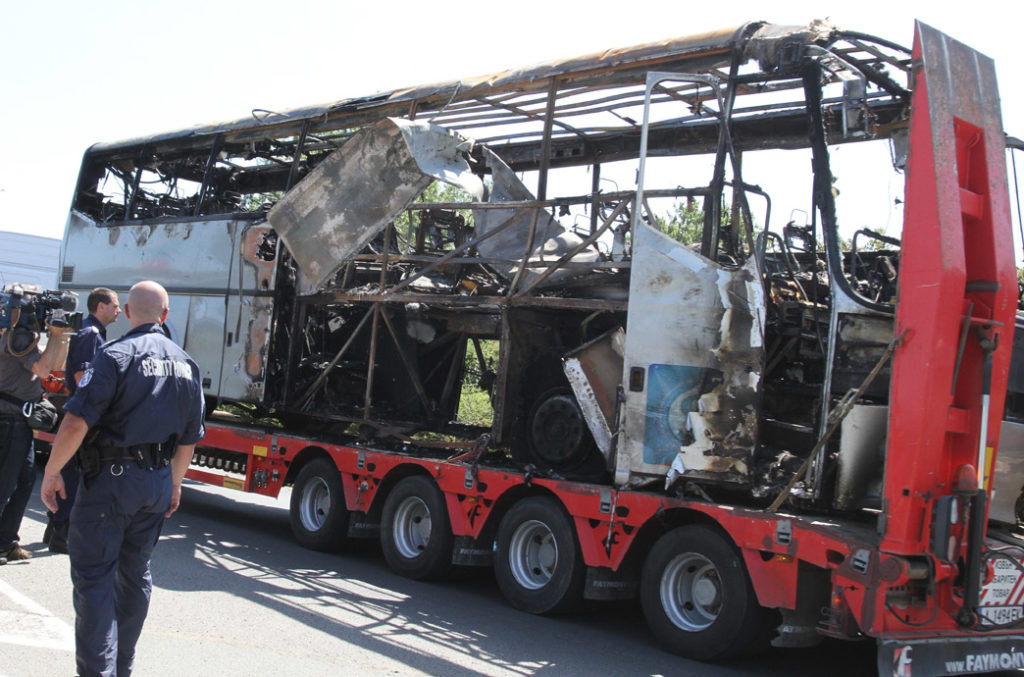IN THE MEDIA
Ban Hezbollah in all its guises or forever be victim to its terror
February 11, 2013 | Colin Rubenstein

Colin Rubenstein
The Australian – February 11, 2013
FOLLOWING revelations that an Australian passport holder is a terror suspect in the July 18, 2012, Burgas bus bombing in Bulgaria that killed six people, it is high time all countries, including Australia, banned Hezbollah in its entirety.
Bulgarian Interior Minister Tsvetan Tsvetanov said in an update on the investigation into the bombing, “There is data showing the financing and connection between Hezbollah and the two suspects . . . What can be established as a well-grounded assumption is that the two persons whose real identity has been determined belonged to the military wing of Hezbollah.”
Confirmation Hezbollah committed an act of terror on European soil has placed belated pressure on the EU to label it a terrorist group. The EU has until now lacked the political will to ban any part of Hezbollah, despite the European Parliament passing a resolution in 2005 that stated, “clear evidence exists of terrorist activities on the part of Hezbollah”.
Reportedly, The Netherlands, which already bans Hezbollah in its entirety, and Britain, which bans Hezbollah’s military wing, have been urging the EU to blacklist the group. Opposition has come primarily from France and Germany, where Hezbollah is known to be highly active. According to Berlin’s domestic intelligence service, there are about 950 Hezbollah members and supporters in Germany alone.
The case for a ban is compelling. Hezbollah is an international terrorist organisation backed by Iran and by Syria’s Assad regime, which has committed acts of terror worldwide. Recently, it planned terrorist attacks in Thailand, Kenya, Turkey, India, Azerbaijan, Cyprus and Georgia. Hezbollah is also allegedly responsible for a long list of atrocities including: the 1983 barracks bombing in Beirut that killed 241 US marines and 58 French paratroopers; bombings in Paris in 1985 and 1986 that killed 13; the 1985 hijacking of TWA flight 847 in Greece; and a 1984 bombing in Spain that killed 18. It also allegedly attacked the Israeli embassy in Buenos Aires in 1992, killing 29, and bombed the Argentine Israelite Mutual Association in Buenos Aires in 1994, killing 85.
Meanwhile, reports say that in recent months thousands of Hezbollah personnel/fighters have been in Syria helping despot and Hezbollah patron Bashir al-Assad in a civil war that has resulted in the slaughter of tens of thousands of civilians.
If it were banned in the EU, many experts believe Hezbollah’s ability to organise, recruit and raise funds would be sharply curtailed. The Secretary General of Hezbollah, Hassan Nasrallah, shares the same assessment, reportedly saying a few years ago that if the EU designated Hezbollah as a terrorist group in its entirety, the “sources of our funding will dry up and the sources of moral, political and material support will be destroyed”.
So does Washington. Barack Obama’s counter-terrorism chief John Brennan told his European counterparts last October that “failure to designate Hezbollah as a terrorist organisation makes it harder to defend our countries and protect our citizens”.
Brennan repeated his call last week, asking Europe and the international community to take “action to uncover Hezbollah’s infrastructure and disrupt the group’s financing schemes and operational networks in order to prevent future attacks”.
However, it is not sufficient for the EU to ban only Hezbollah’s military wing — the whole organisation should be banned. Making distinctions between Hezbollah’s political, social and military wings is artificial. Even Hezbollah admits it operates as one organisation. In 2002, Hezbollah parliamentarian Muhammad Fanish stated on Hezbollah television al-Manar “there is no separating between Hezbollah’s military and political arms”.
Likewise, in 2009, Hezbollah’s Deputy Secretary Naim Qassam disparaged those who “try to distinguish between the military wing and the political wing (of Hezbollah).” He stated “every member of the resistance (i.e. Hezbollah) is a politician, and every politician is a member of the resistance. You won’t find with us a political stance and a (separate) position of the resistance. Our general secretary on the pulpit and at the fronts, and the fighter at the front, we are all the resistance and we are all policymakers.”
This is an important issue for the Australian government to consider given that, under legislation passed in 2003, Australia only bans Hezbollah’s External Security Organisation. According to the Australian government, Hezbollah’s ESO “is a discrete branch within Lebanese Hizballah responsible for the planning, co-ordination and execution of terrorist attacks against Hizballah’s enemies outside of Lebanon.”
While listing the ESO as a terrorist group is important, other countries, including the US, Canada, Israel, The Netherlands, Egypt and Bahrain, have banned Hezbollah in its entirety. Banning the ESO alone enables Hezbollah to organise in Australia under the pretence of representing only its “political” or “social” side.
Hezbollah has been very active throughout Australia’s own region in recent years. According to American counter-terrorism expert Matthew Levitt, during the 1990s, “intelligence reports indicated that Hizballah operatives were active in Thailand, The Philippines, Singapore, Malaysia, Australia and even Myanmar”.
Australian authorities are aware of these concerns. There have been reports of police investigating alleged Hezbollah ESO cells, and Hezbollah flags regularly appear at anti-Israel demonstrations. In addition, al-Manar broadcasts into Australia via the major Indonesian telecommunications provider Indosat, and is used to mobilise support for the organisation. This is despite a 2010 Australian Communications and Media Authority report into al-Manar, which found it breached regulations, glorified terrorists and promoted anti-Semitism.
With an Australian a suspect in the deadly Bulgarian terror attack orchestrated by Hezbollah, there are compelling reasons for Australia and other countries to reassess their position on Hezbollah and ban the entire organisation.
When it comes to Australia’s national interest in counter-terrorism, half-measures simply do not stack up either strategically or morally.
Colin Rubenstein is executive director of the Australia/Israel & Jewish Affairs Council.
Tags: Australasia, Hezbollah, Indonesia, Malaysia, Singapore





